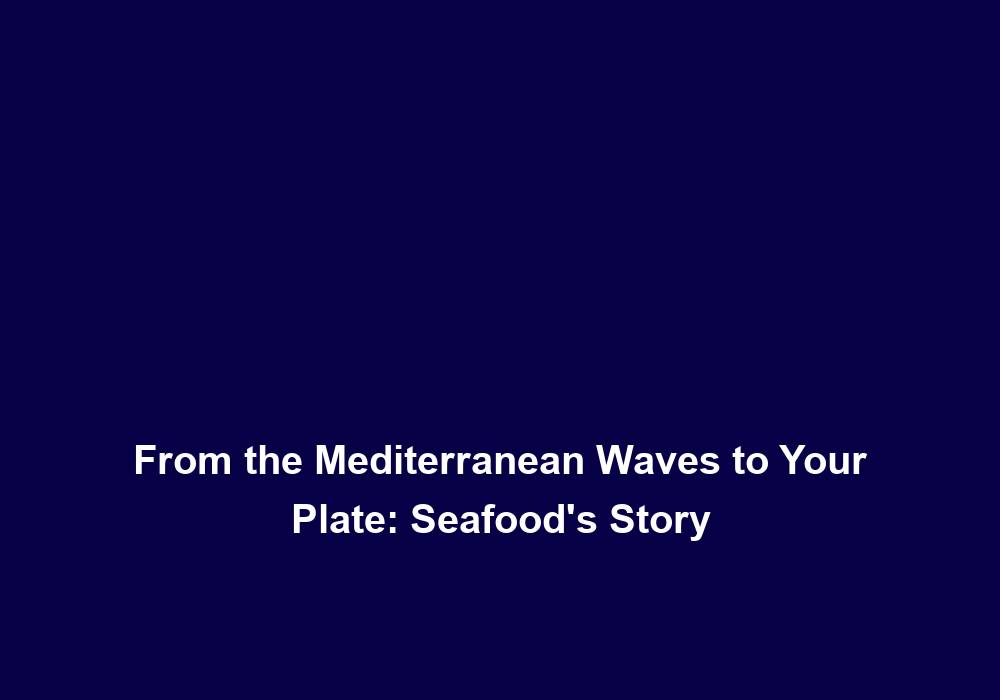From the Mediterranean Waves to Your Plate: Seafood’s Story
Seafood has been a staple in human diets for centuries, providing a rich source of nutrients and flavors. From the Mediterranean waves to your plate, the journey of seafood is not only intriguing but also essential to understanding its impact on our health and planet. In this article, we will delve into the fascinating story of seafood, exploring its origins, environmental considerations, health benefits, and culinary versatility.
Origins of Seafood
Seafood has a long and storied history, with evidence of early human consumption dating back thousands of years. Coastal communities around the world, especially those situated near abundant water bodies like the Mediterranean Sea, have relied on seafood as a primary source of sustenance. The availability of fish and shellfish in these regions has shaped the culinary traditions and cultural practices of ancient civilizations.
The Mediterranean Sea, renowned for its diverse marine life, has played a significant role in shaping seafood traditions. Ancient cultures such as the Greeks and Romans cherished seafood as a delicacy, incorporating it into their daily meals and festive celebrations. The region’s abundant fish, shellfish, and crustaceans not only provided sustenance but also influenced cultural practices and culinary techniques.
Over time, the popularity of seafood spread across continents as civilizations developed and trade networks expanded. Explorers and merchants introduced new seafood varieties to different regions, leading to the integration of diverse flavors and cooking methods into local cuisines.
Environmental Considerations
While seafood is a beloved culinary delight, it is crucial to consider the environmental impact of our choices. Overfishing and destructive fishing practices pose a significant threat to marine ecosystems and biodiversity. Unsustainable fishing practices can deplete fish populations, disrupt the delicate balance of marine ecosystems, and harm other species dependent on those ecosystems.
To address these concerns, sustainable fishing methods have gained prominence. These methods include using selective gear to minimize bycatch, implementing catch limits to prevent overfishing, and establishing marine protected areas to allow fish populations to recover. Sustainable fishing practices help preserve fish populations, maintain the health of marine ecosystems, and ensure the long-term availability of seafood.
Additionally, responsible sourcing and aquaculture practices are gaining momentum as viable alternatives to wild-caught seafood. Well-managed fish farms can alleviate the pressure on wild fish stocks while providing a controlled environment for breeding and harvesting seafood. However, it is essential to ensure that these aquaculture operations prioritize sustainability, minimize pollution, and prioritize the welfare of farmed fish.
Consumers can contribute to the preservation of marine ecosystems by making informed choices. Supporting certified sustainable seafood, such as products labeled with the Marine Stewardship Council (MSC) certification, helps promote responsible fishing practices and encourages the seafood industry to prioritize sustainability.
Health Benefits of Seafood
Seafood offers numerous health benefits, making it a fantastic addition to a balanced diet. It is an excellent source of high-quality protein, essential omega-3 fatty acids, vitamins, and minerals. Incorporating seafood into your meals can promote heart health, brain function, and overall well-being.
Omega-3 fatty acids, commonly found in fatty fish like salmon, sardines, and mackerel, play a crucial role in reducing inflammation, improving cardiovascular health, and supporting brain development. These essential fats have been linked to a reduced risk of heart disease, stroke, and certain mental health conditions.
In addition to omega-3 fatty acids, seafood is also a rich source of vitamins and minerals. It is particularly high in vitamin D, which is essential for bone health and plays a vital role in the regulation of calcium and phosphorus levels in the body. Seafood also contains vitamin B12, iodine, selenium, and zinc, which are necessary for various bodily functions, including maintaining healthy bones, supporting the immune system, and promoting optimal thyroid function.
Including a variety of seafood in your diet can provide a well-rounded source of essential nutrients, contributing to overall health and vitality.
Culinary Versatility of Seafood
One of the most remarkable aspects of seafood is its culinary versatility. From simple grilled fish to elaborate seafood dishes, the possibilities are endless. Seafood can be enjoyed in various forms, including raw, steamed, poached, fried, or incorporated into soups, stews, and stir-fries.
The Mediterranean region, with its rich culinary heritage, offers a wide array of seafood-based dishes. From Spanish paella to Italian cioppino and Greek grilled octopus, each culture has its unique way of showcasing the flavors and textures of seafood. These dishes often feature an abundance of fresh herbs, citrus, olive oil, and aromatic spices that complement the delicate flavors of seafood, resulting in vibrant and memorable culinary experiences.
Seafood’s versatility extends beyond cultural boundaries. It can be paired with a variety of ingredients and flavors to create diverse and exciting dishes. For example, seafood can be combined with tropical fruits for a refreshing ceviche, or incorporated into pasta dishes with rich tomato-based sauces. The mild taste of some seafood varieties also makes them suitable for experimenting with different cooking techniques and flavor profiles.
Whether you prefer the simplicity of a lemon-butter sauce with grilled fish or the complexity of a seafood bouillabaisse, there is a seafood dish to suit every palate. Exploring the culinary versatility of seafood can be a delightful journey of taste and discovery.
Conclusion
Seafood’s story is one of ancient traditions, environmental responsibility, health benefits, and culinary delight. From its origins in the Mediterranean waves to its place on your plate, seafood has captivated cultures worldwide for centuries. Understanding the origins and environmental considerations of seafood allows us to make informed choices that support sustainability and preserve marine ecosystems. By incorporating seafood into our diets, we can enjoy its numerous health benefits, including essential nutrients and omega-3 fatty acids. The culinary versatility of seafood offers endless possibilities for creating delicious and memorable meals. So, the next time you savor a seafood dish, remember the journey it undertook from the depths of the ocean to your plate, and appreciate the flavors and nourishment it provides.





